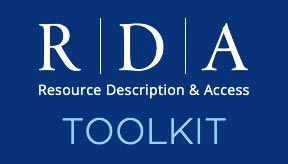Answers to Questions from AL Live Webcast

An online event entitled What's Next for RDA and the 3R Project? was held on September 14th as part of the American Libraries Live (AL Live) series of webcasts. Panelists of the event included:
- Thomas Brenndorfer, NARDAC Representative to the RSC
- Gordon Dunsire, Chair of RSC
- Kathy Glennan, Chair-elect of RSC
- James Hennelly, Director of RDA Toolkit
It was a free event, open to all, and a recoding of the webcast is available here.
The questions below were posited during the event. Many were answered live, but several questions went unanswered because of time limitations. All the questions are here with written responses.
Aggregates
When will we get the final word on the treatment of aggregates?
The RSC Aggregates Working Group is finalizing its work, and then the RSC will have to review and approve the working group’s recommendations. The approved approach to aggregates is expected by the end of the year.
Is the work you're doing on aggregates and serials being informed by CONSER?
Yes. The Ad Hoc Serials Task Force of the RSC Aggregates Working Group included CONSER experts.
Application Profiles and Policy Statements
Would LC-PCC PSs be considered an application profile?
Policy statements can function as a type of application profile. LC-PCC PSs in part function as a kind of application profile. For example, some LC-PCC PSs direct the reader to apply an option or not to apply an option. But LC-PPC PSs also provide supplemental information and examples that go beyond what would be expected of an application profile.
If an application profile is a necessity with the new Toolkit, but one works in a consortium where many are not full-time/professional catalogers--who is expected to develop the profile and make all the decisions? And if one can't afford the Toolkit for many, and things are not "rules" anymore--how can this be explained to part-time/temporary employees?
Application profiles can come in many different forms. It can be a policy statement set such as British Library Policy Statements. It can be expressed through a series of locally shared notes. It can also be done through documents shared on the Toolkit, either globally or locally. Finally it can be done through filtered views of RDA content made available on the Toolkit (though this is not yet ready). Many of these approaches are shared on the Toolkit and in the case of documents can be copied and edited for local needs. For those relying on the print version of the new RDA, bringing together application profiles with the instructions will require in-house effort. In all cases, training and orientation to the new Toolkit will be critical.
Will those APs be made public and freely available, though? (i.e., free)? And who will be able to sort through the various APs to make sure they're applicable locally in any given system?
The public availability of the APs will depend on the policy of their creators. Content posted on the Toolkit is typically available to Toolkit subscribers (unless the content creator prefers to keep it private), and some of the content (typically policy statements) is available to non-subscribers. We anticipate that some APs will be available outside of the Toolkit as well.
Terminology questions: will there still be "policy statements" or will they now be termed "application profiles"?
Yes, there will still be policy statements and they will be called “policy statements” or “best practices” or whatever the content creators feel is the appropriate title. A policy statement set usually contains more information than expected of an application profile.
If we're to rely on the APs/Policy Statements for actual practical cataloging, why would one consult the Toolkit?
The Toolkit provides RDA instructions and will provide an integrated display of that content along with APs/Policy Statements.
Are any application profiles currently being developed?
Preliminary work has begun.
Numbering of Instructions
Why not include citation number in the text? Why add an extra step to get it?
Those who did not attend the event should listen to the recording of the event for a rough description of the citation number solution we are pursuing. The assumption is that most users will use the linking tool to direct colleagues to a passage of RDA. The numbers are meant for print citation of RDA instructions in printed materials, such as professional literature. The numbers will be random and potentially up to eight digits. We are hesitant to clutter up the display with a number that we don’t expect to be used heavily. We ask that users give the numberless display a chance and assess the experience after the content is complete and stable.
How about giving people the option of hiding the number or not. Some people value them.
We will consider this display option.
How will citations be done in professional lit without numbers? Also with WMS stating that the master record is the local record and changes cannot be made to certain parts of record, how can we make decisions specifically for us and our situation?
The citation numbers are being designed to meet the professional literature use case. Concerns about WMS master/local record distinctions should be addressed to OCLC.
So can I globally choose to display citation numbers in the Toolkit when my students and I are using it? Or do we need to click on each instruction individually to reveal its number?
If we allow for the display of citation numbers, it will be global.
Toolkit Features
What will be the order of elements in the graphic browser - alphabetical?
This is not yet determined, but it is unlikely to be alphabetical. The element list for each entity is alphabetical.
Can clarification be provided for attendees on whether the Relationship Matrix contains relationship designators (see End of Year Goals slide) or relationship elements. Relationship designators have become relationship elements so that slide makes it sound like relationship designators will be reinstated.
That slide you reference is in error, a case of mistakenly using an out-of-date term in describing the beta site. Relationship designators have evolved into relationship elements.
Is the mapping from RDA elements to MARC 21 already available in the beta?
Yes, but the quality and display of the mapping will be improved with the next release of the beta site.
How are we to understand "optional" in the many cases where the Toolkit only shows *one* option, so there doesn't seem to be any choice? I still haven't got this, but it may be only me, of course.
An option in RDA is an action that is considered valid but is not required. RDA assumes an “open world” metadata environment, where there is always another option, even if it is not explicit.
Will personal bookmarks remain?
The function of bookmarking remains. But your bookmarks for the original toolkit will not be carried over to the new site.
Translations
When translations are expected to be done? especially the Spanish one since the Natl Lib of Spain and other in Latin America are moving toward RDA
At this juncture it is hard to say. The English version of the new RDA needs to stabilize before the translation work can be completed. In addition, each translation team faces different challenges in completing the work, challenges that may relate to the target language or the timing and availability of resources. Our hope is that all translations would be completed before the end of 2019.
Will our toolkit subscription include access to the translations of RDA?
Yes.
3R Project
What do you recommend for people who have used the original RDA Toolkit with success, but with regards to the beta Toolkit, feel confused or uncertain?
Many folks felt confused and uncertain about the original Toolkit when it came first debuted. We are preparing training for both using the Toolkit and navigating the reorganized standard that we hope to have ready around the same time that RDA stabilizes.
Have you / will you engage in usability testing of the Toolkit by individuals in the RDA user community?
We have no plans for for a formal usability study at this time. The European RDA Interest Group (EURIG) is conducting a usability study and will share the results with the RSC and the publishers of RDA Toolkit. We welcome all feedback from users of RDA and RDA Toolkit.
Is RDA Toolkit 508 compliant?
No, but when the beta site is completed, it will be. We are targeting a AA rating on the WCAG Guidelines.
